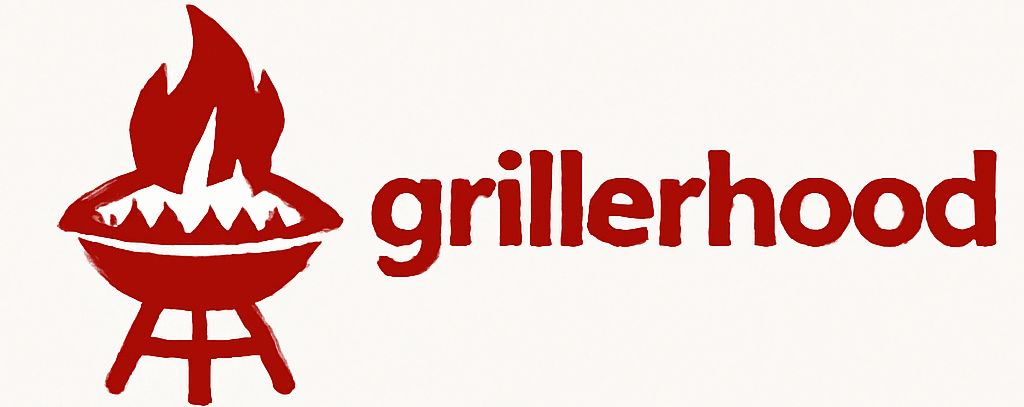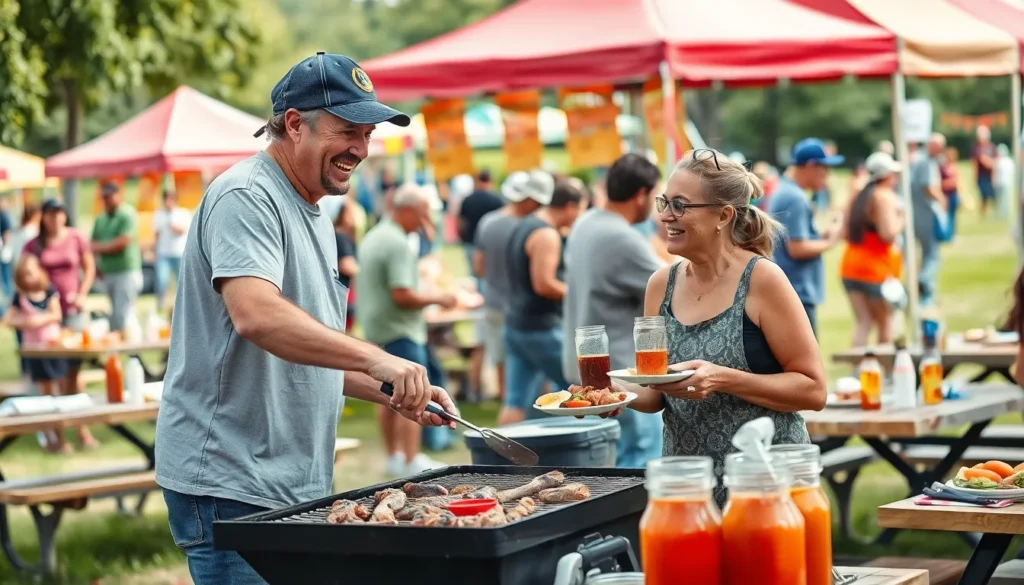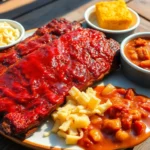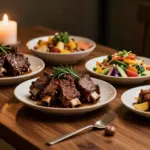Nothing brings people together quite like the smoky aroma of perfectly grilled meats and the friendly competition of a BBQ cook-off. Whether you’re organizing a neighborhood gathering or planning a large-scale community event, we’ve discovered that the right contest ideas can transform an ordinary cookout into an unforgettable experience that keeps participants talking for months.
We know that planning a successful BBQ competition requires more than just firing up the grills. The best cook-offs combine creative categories, captivating activities, and clever judging criteria that showcase everyone’s unique grilling talents while building lasting memories and community connections.
From beginner-friendly backyard battles to elaborate themed competitions, we’ll share proven contest ideas that guarantee maximum participation and excitement. These creative approaches will help you design an event that celebrates both culinary skills and community spirit.
Classic Competition Categories for Your BBQ Cook Off Contest Ideas
Traditional BBQ categories form the backbone of successful cook off contests, drawing participants who want to showcase their mastery of iconic American barbecue styles. These time-tested competition formats create excitement while honoring the create’s rich heritage.
Brisket Showdown Challenge
Brisket competitions test participants’ ability to transform tough cuts into tender, flavorful masterpieces. We recommend setting a 12-14 hour cook time limit, allowing competitors to demonstrate their low and slow technique mastery. Judges evaluate entries based on appearance, tenderness, and flavor balance.
Scoring criteria should include bark development, smoke ring presence, and moisture retention. Participants typically present their brisket in uniform slices, showcasing the pink smoke ring and proper grain direction. Entry fees usually range from $50-75 per team, with prizes often exceeding $500 for first place winners.
Temperature requirements mandate internal cooking temperatures of 195-205°F for optimal tenderness. Competitors must use whole packer briskets weighing 12-16 pounds, ensuring fairness across all entries. Turn-in times typically occur between 12:00-1:00 PM, allowing judges adequate evaluation time.
Ribs Recipe Rivalry
Ribs categories generate intense competition as participants showcase their signature rub and sauce combinations. We suggest offering both pork spare ribs and baby back ribs divisions, accommodating different cooking preferences and techniques. Judges focus on meat texture, flavor penetration, and overall presentation quality.
Entry specifications require full racks with minimum 10 bones, ensuring consistent portion sizes for evaluation. Competitors choose between St. Louis style spare ribs or untrimmed baby backs, each requiring exact preparation methods. Cook times typically range from 5-7 hours, making this category accessible to weekend warriors.
Presentation standards call for six bone portions arranged in approved KCBS turn-in boxes. Sauce application becomes crucial, with judges evaluating whether competitors achieve the perfect balance between meat flavor and complementary seasonings. Prize structures often include $300-400 first place awards, reflecting the category’s popularity.
Pulled Pork Perfection Contest
Pulled pork competitions celebrate versatility as participants transform pork shoulders into succulent, shreddable perfection. We recommend allowing both bone-in Boston butts and boneless shoulder cuts, giving competitors flexibility in their approach. Cook times typically span 10-12 hours, testing patience and technique consistency.
Texture evaluation focuses on proper shredding ability without mushy or dry characteristics. Judges assess whether competitors achieve the ideal balance between tender meat and structural integrity. Seasoning penetration throughout the meat becomes a key differentiator between winning and losing entries.
Turn-in requirements specify 12-16 ounce portions in unmarked containers, ensuring blind judging procedures. Competitors often debate sauce integration versus serving sauce separately, with judges evaluating both moisture content and flavor harmony. First place winners frequently receive $250-350 cash prizes plus trophies recognizing their pulled pork mastery.
Creative Themed BBQ Cook Off Contest Ideas to Spice Things Up
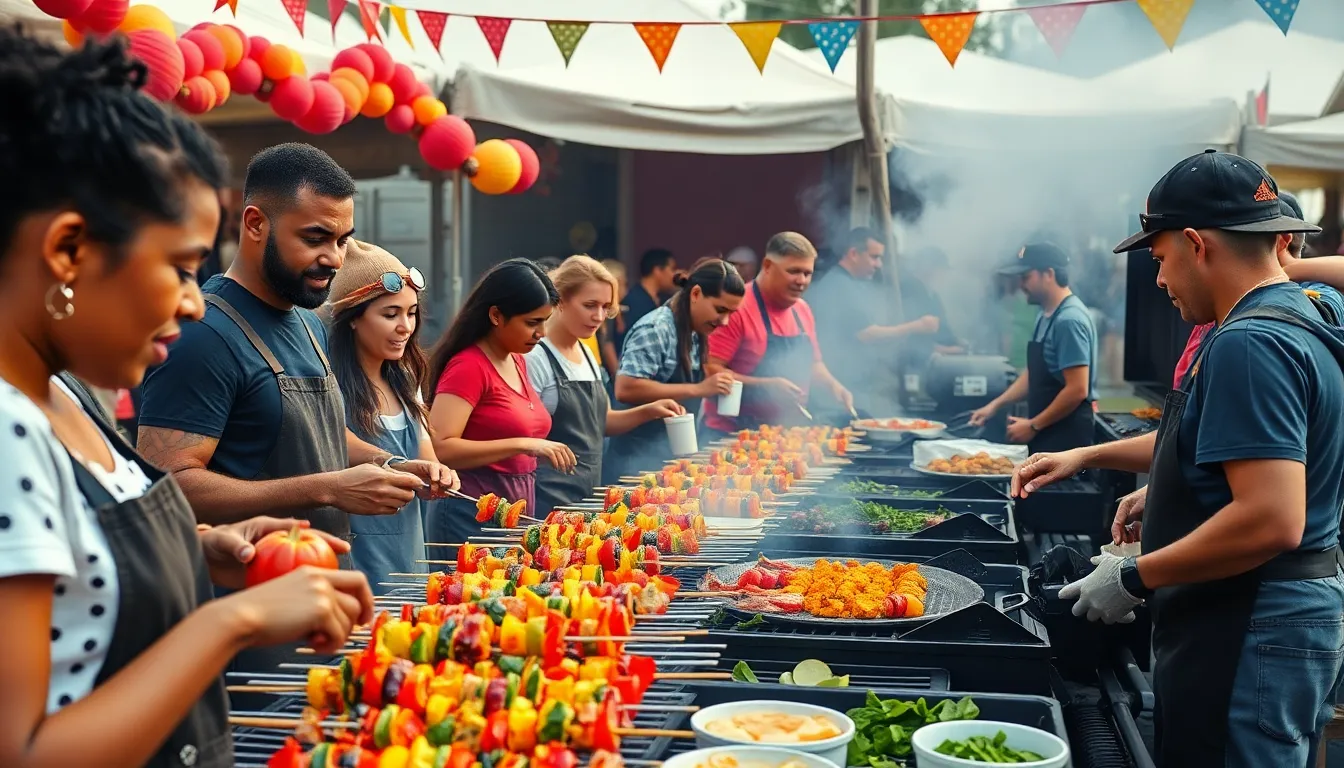
Moving beyond traditional categories opens exciting opportunities to showcase diverse culinary talents. These innovative contest themes encourage participants to think outside the smoker while maintaining their BBQ expertise.
International Fusion BBQ Challenge
International fusion BBQ competitions invite participants to combine traditional smoking techniques with global flavors and ingredients. Competitors create unique dishes like Korean BBQ tacos featuring gochujang glazed pork belly, Jamaican jerk smoked ribs with scotch bonnet peppers, or Mediterranean spiced lamb with tzatziki sauce.
Judging criteria focus on successful flavor integration rather than authentic regional preparation. Participants must demonstrate how international spices and cooking methods enhance rather than overshadow classic BBQ fundamentals. Popular fusion combinations include Mexican adobo rubs on brisket, Asian five spice on pork shoulder, and Indian curry marinades on chicken.
Entry requirements typically specify that dishes must incorporate at least three international ingredients while maintaining recognizable BBQ cooking methods. Teams often present their fusion creations alongside traditional accompaniments from their chosen cuisine, creating comprehensive cultural BBQ experiences.
Sauce-Only Competition Categories
Sauce only competitions shift the spotlight from meat preparation to condiment creativity and flavor development. Competitors enter homemade barbecue sauces across categories including spicy heat levels, sweet molasses bases, tangy vinegar varieties, and complex smoky blends.
Judging standards evaluate sauce consistency, flavor balance, and how well each sauce complements standard BBQ cuts like ribs and pulled pork. Participants must provide detailed ingredient lists and preparation methods, with many contests requiring live demonstrations of sauce application techniques.
Popular sauce categories include Carolina style vinegar bases, Kansas City sweet and thick varieties, Alabama white sauces, and innovative fusion combinations. Winners often receive recipe publication opportunities and local restaurant partnership offers, making these contests valuable for aspiring sauce entrepreneurs.
Vegetarian and Vegan BBQ Alternatives
Vegetarian and vegan BBQ categories showcase plant based grilling creativity while maintaining traditional smoking and seasoning techniques. Competitors present dishes featuring grilled portobello mushrooms, BBQ jackfruit preparations, colorful vegetable skewers, seasoned tempeh, and innovative seitan creations.
Judging focuses on texture achievement, smoke flavor penetration, and creative use of traditional BBQ rubs and sauces on non meat ingredients. Successful entries often replicate the satisfaction and complexity of traditional BBQ while celebrating unique plant based ingredients.
Entry requirements typically mandate that all ingredients remain completely plant based, including rubs, sauces, and side dishes. Popular techniques include using liquid smoke for flavor enhancement, creating meat like textures through proper vegetable preparation, and developing umami rich marinades using mushrooms and fermented ingredients.
Team-Based BBQ Cook Off Contest Ideas for Community Building
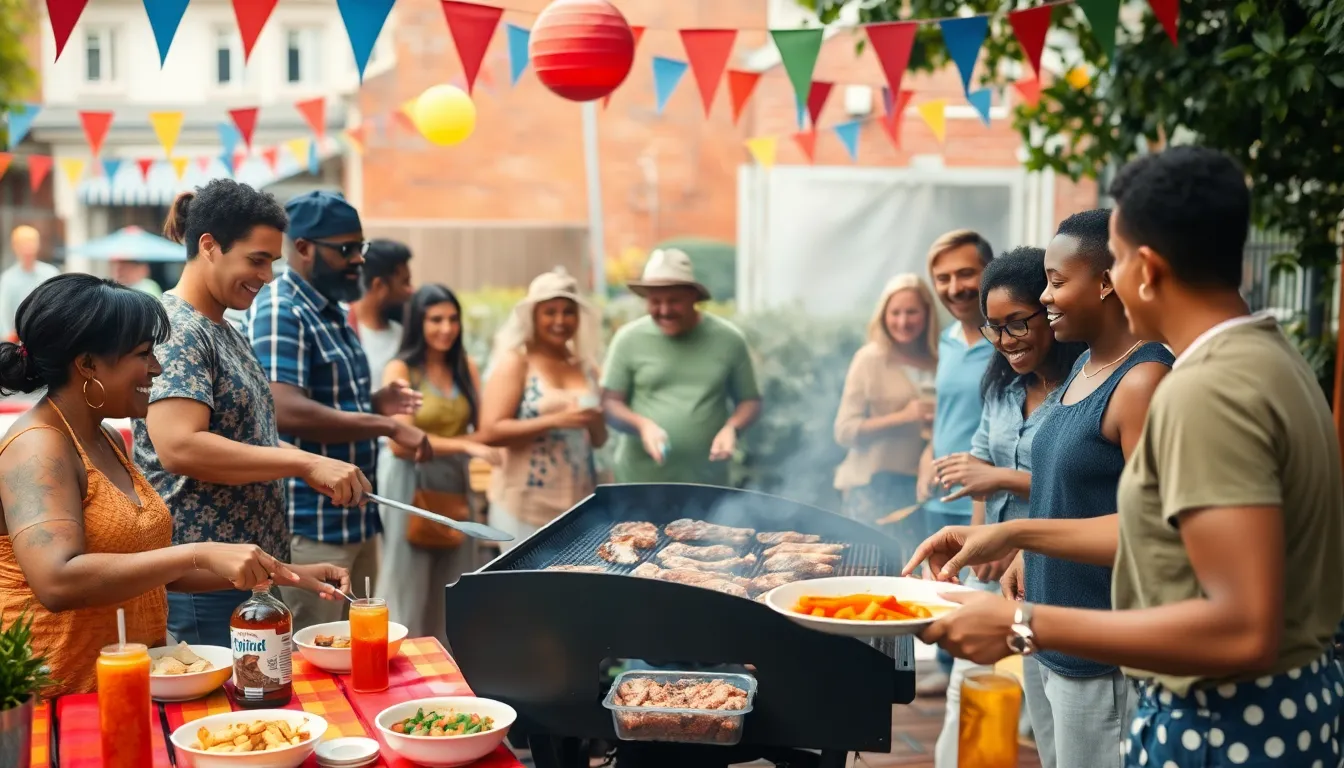
Team competitions transform individual grilling skills into collaborative cooking experiences that strengthen bonds between participants. We’ve discovered that group dynamics create more captivating contests while fostering deeper community connections through shared culinary challenges.
Corporate Team Building Challenges
Themed Cook-Offs challenge employees to work together while exploring creative BBQ interpretations. Companies can organize spicy chili competitions where teams develop unique heat profiles, or host clean cooking challenges that remake classic BBQ dishes into healthier versions. These events encourage employee bonding through friendly competition and shared culinary experiences that extend beyond typical workplace interactions.
Health-Conscious Competitions promote wellness while maintaining the fun atmosphere of traditional BBQ contests. Teams collaborate to create lighter versions of pulled pork using leaner cuts, develop vegetable-forward sides that complement smoked meats, or experiment with international BBQ styles that incorporate fresh herbs and spices. Creative thinking flourishes when corporate groups tackle the challenge of maintaining authentic BBQ flavors while reducing calories and increasing nutritional value.
Innovation Categories push teams to think beyond conventional grilling methods. Companies might introduce “anything but ribs or pork” contests that showcase creativity with chicken, fish, or plant-based proteins cooked on grills like the Big Green Egg. Teams strategize together on signature entries that highlight their collective culinary skills while fostering workplace camaraderie through collaborative menu planning.
Family vs. Family Competitions
Traditional Recipe Showdown celebrates generational cooking wisdom through family heritage contests. Families face off using heirloom recipes like secret BBQ rubs passed down through generations, grandmother’s signature spaghetti sauces adapted for grilling, or traditional smoking techniques that reflect cultural backgrounds. These nostalgic competitions create deeply personal connections while honoring family culinary traditions.
Multi-Generation Collaboration encourages cross-generational interaction through diverse BBQ style competitions. Younger family members might introduce modern fusion techniques while older generations share time-tested smoking methods, creating signature dishes that blend innovation with tradition. Cooperation between different age groups produces unique entries that celebrate both heritage and creativity.
Heritage Celebration Contests allow families to showcase their cultural BBQ traditions through specialized categories. Mexican families might compete with carnitas and grilled vegetables, while Southern families present their regional dry rub techniques or vinegar-based sauce recipes. These competitions promote understanding and appreciation of diverse culinary backgrounds within the community.
Neighborhood Block Party Contests
Community BBQ Themes bring neighbors together through multiple competition categories that showcase local grilling talent. Block parties can feature separate contests for ribs, chicken, and other grilled dishes, inviting residents to share recipes and techniques with their neighbors. These inclusive events create opportunities for community members to discover hidden culinary talents while building lasting relationships.
Cook’s Choice Categories provide flexibility for participants to present their unique BBQ specialties without rigid restrictions. Neighbors can showcase personal style and innovation through signature dishes that reflect their individual preferences, dietary needs, or cultural backgrounds. This format increases community engagement by allowing everyone to participate regardless of their grilling expertise or preferred cooking methods.
Inclusive Participation Options ensure that all community members can join the competition through varied category offerings. “Anything but ribs or pork” contests accommodate different dietary preferences and religious restrictions, while beginner-friendly categories encourage novice grillers to participate alongside experienced BBQ enthusiasts. These diverse options maximize neighborhood participation and create welcoming environments for all skill levels.
Judging Criteria and Scoring Systems for Fair BBQ Competitions
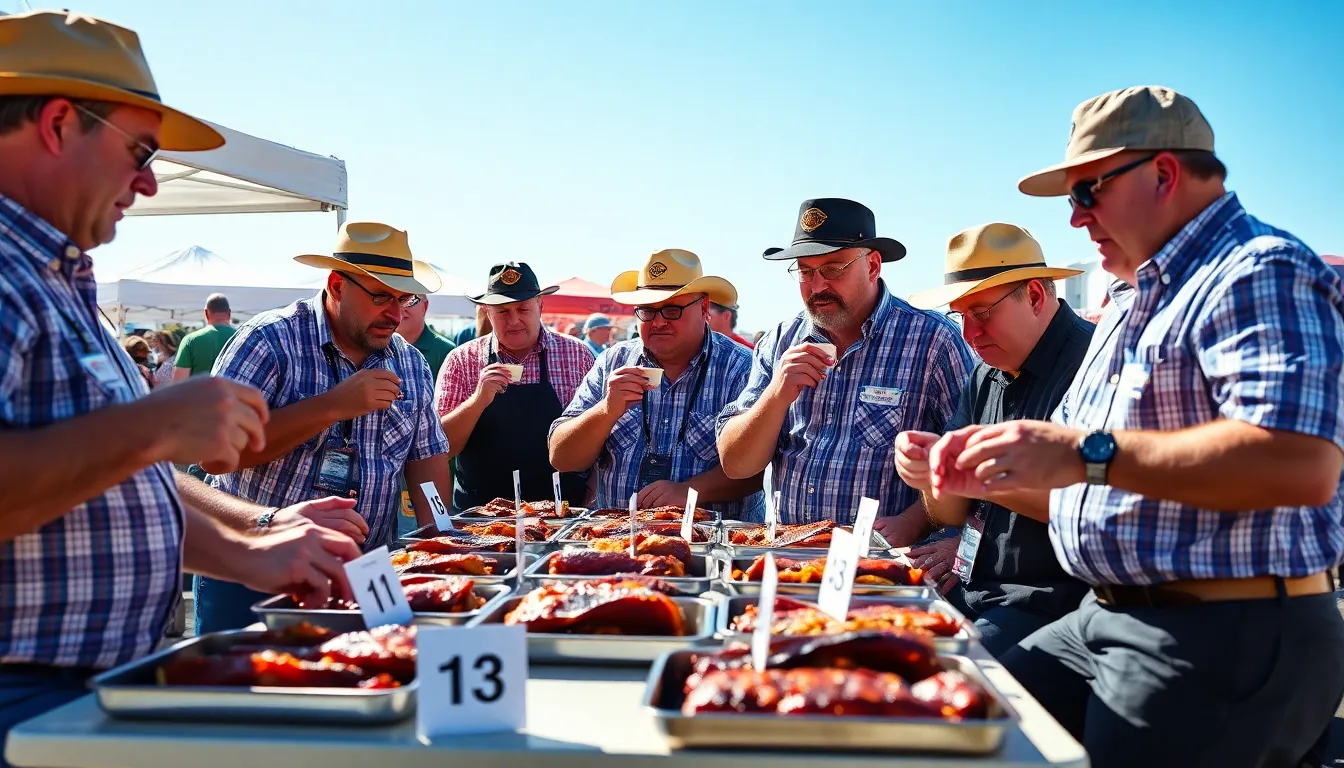
Establishing clear judging standards ensures every competitor gets a fair evaluation while maintaining the integrity of your cook-off event. We recommend using standardized scoring systems that professional BBQ competitions have refined over decades to create consistent and reliable results.
Professional Judge Panel Setup
Certified judges form the backbone of professional BBQ competitions. KCBS (Kansas City Barbeque Society) contests typically feature six certified judges seated at each judging table, ensuring expertise and consistency across all evaluations. These trained professionals score entries individually without comparing notes or revising their initial assessments, which maintains the integrity of each judgment.
Judge rotation enhances fairness across different BBQ categories. We suggest having judges move between stations or conduct on-site evaluations for specialty categories, allowing their expertise to benefit diverse grilling styles. This approach prevents bias toward exact cooking methods while ensuring each entry receives knowledgeable evaluation from multiple perspectives.
Training requirements for judges establish credibility in your competition. Most professional contests require judges to complete certification programs that teach proper evaluation techniques, scoring consistency, and bias elimination methods. We recommend recruiting judges who understand the nuances between chicken, pork ribs, brisket, and pulled pork categories.
People’s Choice Voting Methods
Public voting adds an interactive element that engages attendees beyond passive observation. Contestants serve samples to event participants who cast votes for their favorite entries using ballot boxes, tokens, or digital voting apps depending on your event’s scale and technology preferences. This format allows crowd favorites to gain recognition alongside expert judging results.
Concurrent voting systems maximize participation while maintaining organized flow. We suggest running people’s choice voting simultaneously with official judging to keep attendees engaged throughout the competition timeline. Event organizers can distribute voting materials upon entry or set up designated tasting stations where participants sample entries before casting their votes.
Separate recognition categories acknowledge both expert and popular preferences. People’s choice winners often differ from professional judge selections, creating additional prize opportunities that celebrate crowd-pleasing flavors and presentation styles. This dual recognition system adds excitement while honoring different aspects of BBQ excellence.
Blind Tasting Competition Format
Anonymous entry submission eliminates bias and ensures impartial evaluation. Entries arrive in numbered containers or coded boxes that prevent judges from identifying which competitor prepared each dish. This system allows judges to focus solely on sensory qualities like appearance, taste, tenderness, and aroma without influence from competitor reputation or presentation gimmicks.
Standardized scoring scales create consistent evaluation across all entries. Most competitions use 1 to 9 or 1 to 10 point systems where judges rate each criterion with whole numbers only. We recommend throwing out the lowest score among judges to minimize potential bias, which many professional contests have adopted as standard practice.
Category-exact evaluation criteria ensure comprehensive assessment of BBQ skills. Judges typically evaluate chicken, pork ribs, brisket, and pulled pork using identical scoring methods for appearance, taste, tenderness, aroma, and overall impression. In case of ties, brisket scores often serve as the primary tiebreaker, followed by ribs and chicken categories, reflecting the difficulty levels of mastering these different meats.
Prize Categories and Awards That Make BBQ Cook Off Contest Ideas Memorable
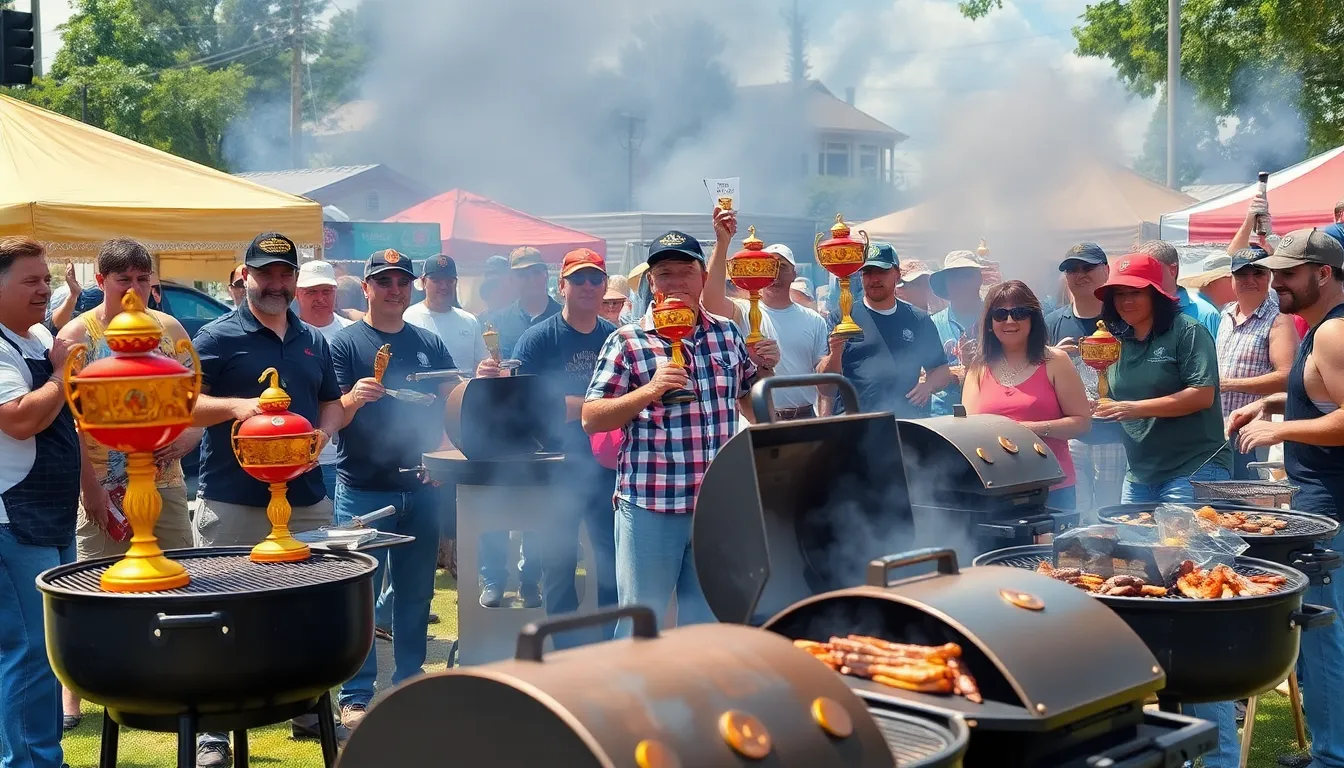
Creating memorable prizes transforms a simple BBQ competition into an unforgettable community celebration. Well-designed awards categories ensure every participant feels valued while celebrating exceptional culinary achievements.
Grand Champion Trophy Ideas
Distinctive grand champion trophies serve as centerpieces that participants will proudly display for years to come. Large BBQ grill or smoker-themed trophies make impressive awards that immediately communicate the competition’s focus. Resin awards shaped like pigs or grills offer detailed craftsmanship that captures the essence of barbecue culture.
BBQ Grill Cookoff Trophies with customizable food displays provide versatility for different contest themes. These awards allow organizers to highlight exact elements like ribs, brisket, or chicken depending on the competition’s focus. Perpetual BBQ awards that carry the champion’s name annually build tradition and create lasting connections between winners and the event.
Custom engraving elevates trophy prestige and adds personal significance to each award. Professional engraving transforms standard trophies into cherished keepsakes that winners treasure. Detailed resin trophies featuring BBQ motifs such as ribs or chickens combine artistic appeal with thematic relevance.
Category-Exact Recognition Awards
Dividing prizes into specialized categories like Best BBQ Chicken, Best Ribs, Best Sauce, or Best Brisket encourages culinary specialization. Category-exact awards give more participants opportunities to win while recognizing diverse grilling talents. Themed trophies and plaques for each category create distinct recognition that matches the exact achievement.
Best BBQ Chicken Perpetual Champion Awards and BBQ Ribs Trophies offer category-focused recognition that celebrates specialized skills. These awards acknowledge expertise in particular cooking techniques while maintaining visual appeal. Smaller themed trophies work perfectly for category winners without diminishing their significance.
Ribbons, pins, and small plaques serve as excellent recognition for runner-ups and special judge awards. These affordable options allow organizers to recognize culinary skills broadly across multiple participants. Judge awards using ribbons and pins create additional recognition opportunities that keep participants engaged throughout the competition.
Fun Side Contest Prizes
Creative side contests like “Best Sauce,” “Hottest BBQ,” or “People’s Choice” awards maintain event energy with unique, amusing trophies. Fun side contests encourage participation beyond traditional meat categories while adding entertainment value. Novelty prizes featuring humorous designs keep the atmosphere light and enjoyable for everyone involved.
“Top Chef Appreciation” plaques and humorous resin awards shaped like pigs or chili peppers add personality to the competition. These playful awards recognize creativity and effort while maintaining the BBQ theme. Amusing trophies create conversation starters and photo opportunities that participants love sharing.
Colorful trophies with thematic designs like chili peppers or flaming grills enhance visual appeal while signifying BBQ culture. These vibrant awards catch attention and create excitement around winning. Side contest prizes promote camaraderie among participants and encourage friendly competition that extends beyond the main categories.
Planning Timeline and Logistics for Successful BBQ Cook Off Events
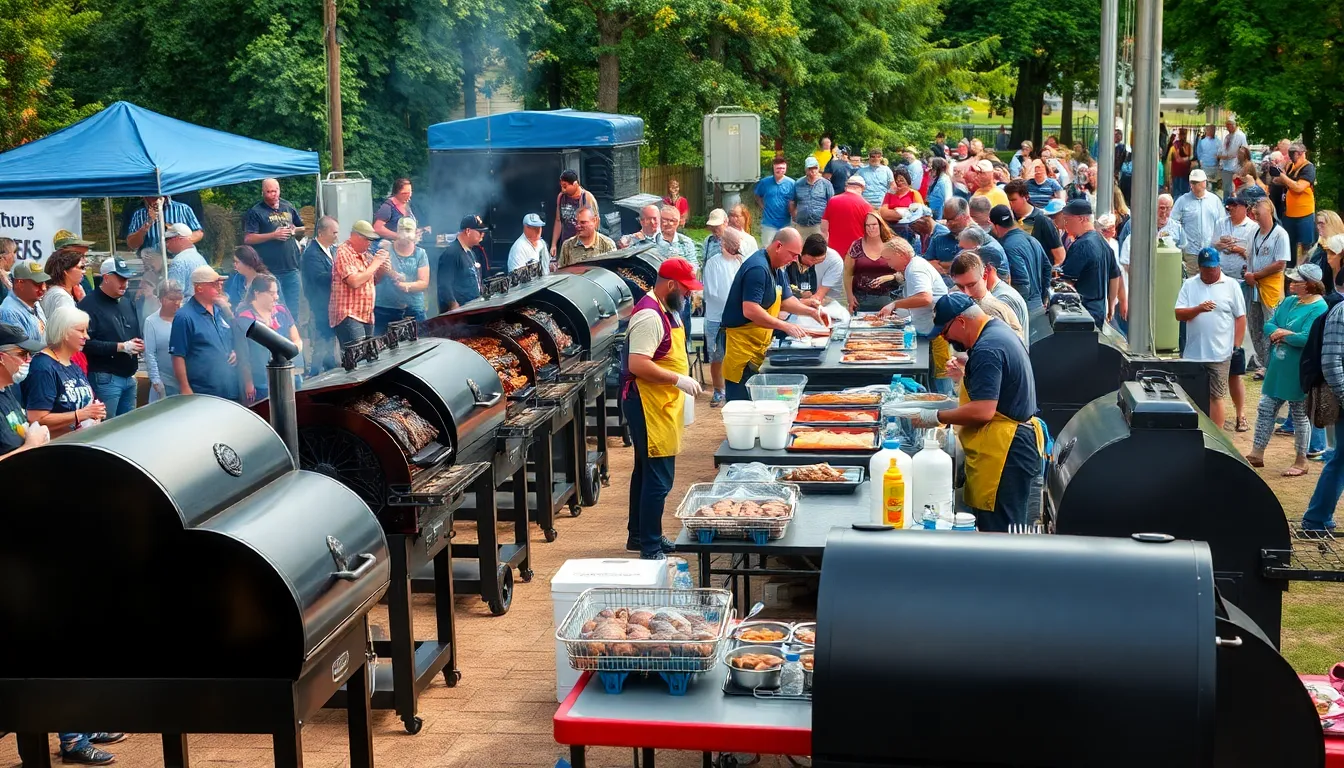
Organizing a successful BBQ cook off requires careful coordination of multiple moving parts to ensure everything runs smoothly on competition day. We’ll break down the essential logistics that transform good intentions into memorable community events.
Equipment and Space Requirements
Cooking stations need adequate space for teams to set up their smokers, grills, and support equipment without interfering with neighboring competitors. Offset smokers, drum cookers, pellet grills, charcoal units, and propane setups each require different spatial considerations and safety clearances.
Essential equipment lists should include reliable thermometers, adequate fuel sources, coolers for meat storage, cutting boards, sharp knives, disposable gloves, aprons, and fire starters. Teams typically bring their preferred cooking vessels, but we recommend providing backup basic equipment for emergencies.
Space layout planning involves designating clear pathways between cooking areas and judging tables, with consideration for crowd flow during peak viewing times. Unloading zones near each station reduce setup stress, while time limited parking prevents early morning congestion.
Access points matter when contestants must deliver hot entries to judges within strict timeframes. We suggest mapping routes from each cooking station to the judging area, accounting for potential bottlenecks during simultaneous turn in periods.
Registration and Entry Fee Structure
Registration deadlines typically close 1-2 weeks before the event to allow adequate planning for space allocation and supply procurement. Early registration often receives discounted entry fees, encouraging prompt commitment from participants.
Check in procedures should occur the morning of competition, allowing teams to confirm their cooking locations and receive official contest materials. Staggered check in times between 6:00-8:00 AM prevent overwhelming volunteer staff.
Entry fee structures vary based on sanctioning body requirements, with KCBS and MBN sanctioned events carrying different fee schedules. Fees typically range from $75-200 per team depending on categories entered and prize pool size.
| Competition Level | Entry Fee Range | Included Categories |
|---|---|---|
| Local Community | $50-75 | 2-3 categories |
| Regional Sanctioned | $100-150 | 4 categories |
| Professional Circuit | $175-250 | 4+ categories plus ancillary |
Team limits depend on available space and volunteer capacity for judging, with most events accommodating 25-75 teams across multiple categories including brisket, ribs, chicken, and pulled pork.
Safety and Health Permit Considerations
Health department inspections occur before cooking begins, requiring teams to demonstrate proper food storage temperatures, clean preparation surfaces, and adequate handwashing facilities. County health officials typically arrive between 7:00-9:00 AM for pre competition checks.
Required permits include food handling licenses, fire safety clearances, and public gathering authorizations that must be secured 30-60 days before the event date. Municipal requirements vary significantly between jurisdictions.
Sanitation stations need strategic placement throughout the cooking area, featuring handwashing facilities with soap dispensers, clean water access, and proper waste disposal containers. We recommend one station per 10-15 teams for adequate coverage.
Fire safety measures mandate accessible fire extinguishers within 50 feet of each cooking station, with clear evacuation routes marked for emergency situations. Local fire marshals often conduct on site inspections before approving cooking operations.
Food safety protocols require teams to maintain proper meat storage temperatures below 40°F until cooking begins, use separate cutting boards for raw and cooked products, and follow proper internal temperature guidelines for each protein category.
Marketing and Promotion Strategies for Your BBQ Cook Off Contest
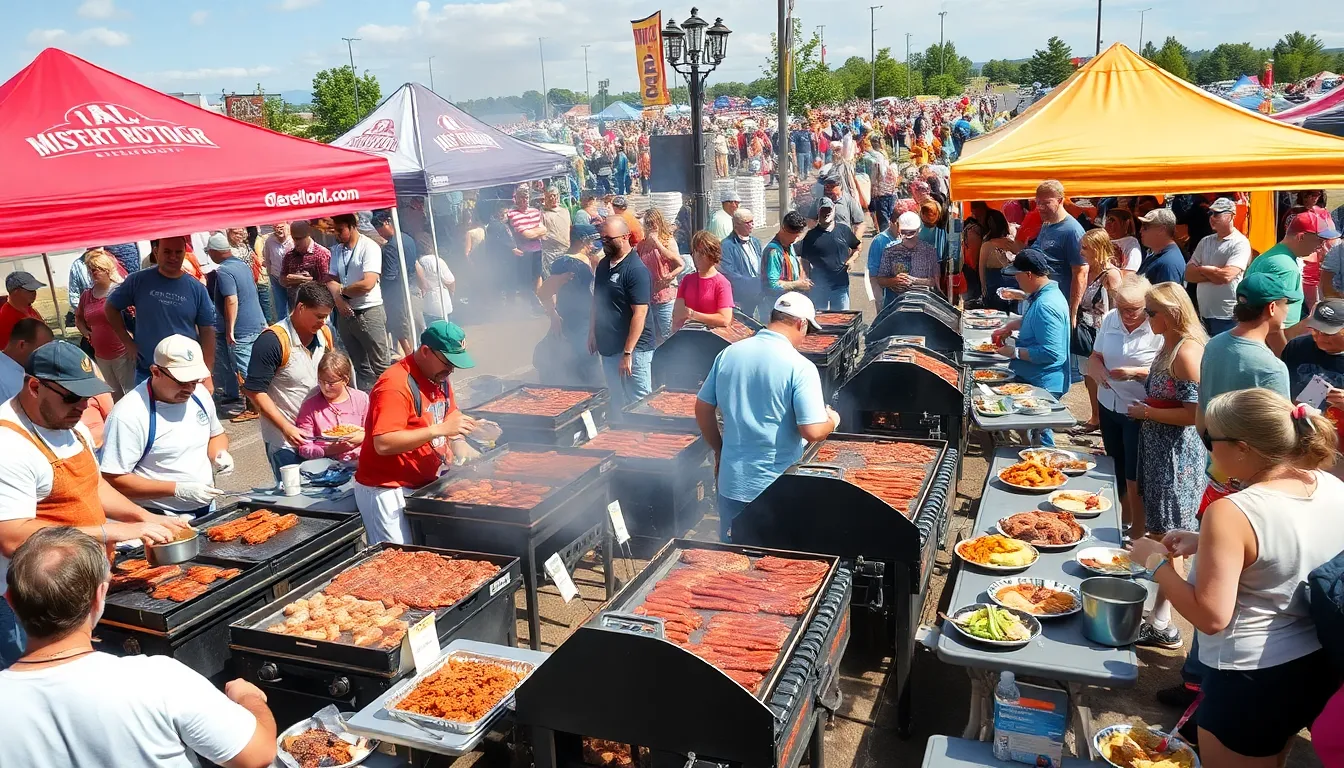
Effective marketing transforms your BBQ cook off from a small gathering into a community-wide celebration. Strategic promotion attracts participants, sponsors, and spectators while building lasting relationships within your community.
Social Media Campaign Ideas
Create compelling visual content by sharing appetizing photos and behind-the-scenes videos of contestants preparing their dishes to build anticipation throughout your community. We recommend posting daily content featuring different BBQ techniques, ingredient preparation, and cooking tips to maintain engagement leading up to the event.
Develop a dedicated event hashtag to encourage sharing and user-generated content across all social platforms. Interactive elements like polls asking followers to vote on their favorite BBQ categories or live streams during the event create real-time engagement and excitement.
Launch contests and giveaways for event tickets or BBQ-related merchandise to boost engagement and attract new followers to your social media channels. Prize packages featuring local restaurant gift cards, grilling accessories, or free entry registrations generate buzz while expanding your reach.
Use multiple platforms strategically by posting regular updates on Facebook, Instagram, and Twitter with platform-exact content customized to each audience. Facebook events work well for detailed information sharing, Instagram Stories capture behind-the-scenes moments, and Twitter provides quick updates and real-time interaction during the competition.
Local Business Sponsorship Opportunities
Partner with local businesses for sponsorships to cover event costs while increasing your competition’s credibility and community support. Restaurants, grocery stores, and equipment suppliers often welcome opportunities to connect with food enthusiasts and demonstrate their commitment to community events.
Offer valuable sponsor branding on event materials, tents, banners, and social media shoutouts to provide tangible value for your sponsor investments. Custom tent displays, branded scorecards, and logo placement on promotional materials create visible recognition that sponsors appreciate.
Collaborate with local meat suppliers and equipment vendors to provide prizes or product samples, creating mutual promotion opportunities that benefit both parties. These partnerships often result in discounted supplies for your event while giving businesses direct access to their target customers.
Develop tiered sponsorship packages that offer different levels of involvement and recognition based on contribution amounts. Premium sponsors might receive naming rights to exact categories, while smaller local businesses can participate through product donations or volunteer support.
Community Outreach and Publicity Methods
Send targeted press releases to local newspapers, radio stations, and community bulletin boards to publicize your event across traditional media channels. Include compelling details about unique contest categories, notable judges, and community benefits to capture media attention.
Engage community organizations such as clubs, schools, and neighborhood associations to help promote and participate in your BBQ cook off. These partnerships widen your event’s reach while creating opportunities for cross-promotion and volunteer recruitment.
Organize complementary activities like live music performances, kids’ zones, or BBQ technique workshops to attract families and increase foot traffic throughout your event space. Additional entertainment options extend visitor stay times and create more opportunities for community interaction.
Connect with local food bloggers and social media influencers to cover your event and share it with their established followers. Invite them as special guests or judges to generate authentic content and expand your marketing reach through their trusted networks.
Conclusion
We’ve covered everything you need to transform your BBQ cook-off from a simple gathering into an unforgettable community celebration. From classic competition categories to creative themed contests these ideas will help you engage participants of all skill levels while fostering genuine connections.
Remember that successful BBQ cook-offs balance competition with community spirit. Whether you’re organizing corporate team-building events or neighborhood block parties the key lies in thoughtful planning and inclusive participation opportunities.
With proper judging systems memorable awards and strategic marketing your BBQ cook-off will become the highlight of your community calendar. Start planning today and watch as your event brings people together through the universal language of great food and friendly competition.
Frequently Asked Questions
What makes a BBQ cook-off successful?
A successful BBQ cook-off requires thoughtful planning, creative contest categories, clear judging criteria, and engaging activities that foster community connections. The key is balancing competition with fun, ensuring participants of all skill levels can participate while showcasing their grilling talents in a welcoming environment.
What are the most popular BBQ competition categories?
Classic categories include the Brisket Showdown Challenge, Ribs Recipe Rivalry, and Pulled Pork Perfection Contest. These traditional competitions form the backbone of most BBQ cook-offs and provide clear entry requirements, standardized judging criteria, and exciting prize structures for participants.
How can I make my BBQ contest more creative and unique?
Consider themed competitions like International Fusion BBQ Challenge, Sauce-Only Competitions, or vegetarian/vegan BBQ alternatives. These creative categories encourage participants to think outside traditional BBQ boundaries while maintaining the authentic grilling experience and community spirit.
What team-based BBQ contest ideas work best?
Popular team-based options include corporate team-building challenges, family recipe showdowns, multi-generational collaborations, and neighborhood block party contests. These formats promote collaboration, celebrate culinary heritage, and strengthen community bonds through shared cooking experiences.
How should BBQ competitions be judged fairly?
Use standardized scoring systems with certified judge panels for consistency. Implement blind tasting formats to eliminate bias, and consider people’s choice voting to engage attendees. Professional judging criteria should focus on taste, presentation, and cooking technique for comprehensive evaluation.
What types of prizes work best for BBQ cook-offs?
Distinctive grand champion trophies, category-specific awards, and fun side contest prizes create memorable experiences. Consider BBQ grill-themed awards, customizable trophies, and humorous prizes for contests like “Best Sauce” or “People’s Choice” to enhance community celebration.
What equipment and space do I need for a BBQ cook-off?
Essential requirements include adequate cooking stations with proper safety clearances, various grill accommodations, and sufficient space for participants and spectators. Plan for electrical access, water sources, and proper ventilation to ensure smooth operations and safety compliance.
What permits and safety measures are required?
Obtain necessary health permits, conduct required inspections, and implement proper sanitation protocols. Fire safety measures, food handling practices, and emergency procedures are essential. Contact local authorities early to ensure compliance with all regulations and safety requirements.
How can I effectively promote my BBQ cook-off?
Utilize social media campaigns with engaging content and event hashtags, secure local business sponsorships, and conduct community outreach through press releases. Partner with local organizations and engage influencers to maximize visibility and community participation.
When should I start planning a BBQ cook-off?
Begin planning at least 2-3 months in advance to secure permits, arrange sponsorships, and handle registrations. Create a detailed timeline covering equipment procurement, venue preparation, judge recruitment, and marketing activities to ensure a well-coordinated event.
